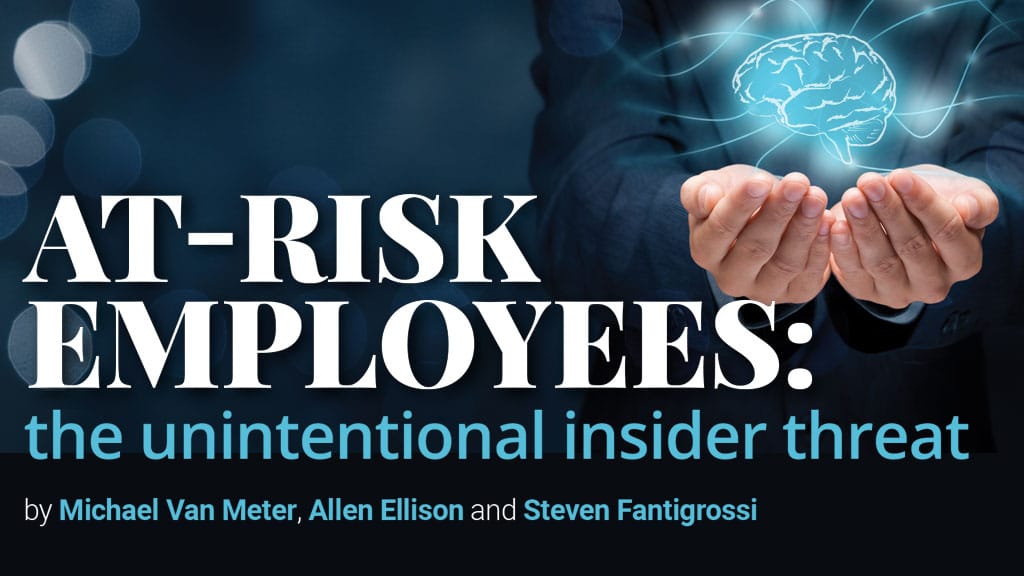In the aviation industry, there is a lot to worry about…particularly when it comes to safety. The Civil Aviation Security Program in the Federal Bureau of Investigation’s (FBI) National Joint Terrorism Task Force is committed to ensuring the safety of the skies of the United States. This is no easy task; there are many threats including terrorist activity and the criminal element. However, one threat that does not receive quite as much attention is that posed by people who may cause harm, even when it is not their intention.
In addition to terrorist and criminal insiders, unwitting at-risk employees who may suffer from depression, loneliness, and mental illness or who face addictions such as drugs or alcohol are vulnerable to exploitation. Malicious actors who seek to exploit an insider’s addiction may blackmail an employee to gain unfettered access into the global aviation system or may target an apathetic employee to circumvent screening. We rely on our people, including law enforcement, screening personnel, flight attendants, and pilots to be coherent and engaged 100% of the time. Insiders who abuse substances may not be at the cognitive level required to do their job effectively or safely. Addiction can cause absenteeism, increase the probability of an accident, create confusion, lead to difficulty concentrating, and lower employee efficiency. In recent years, several at-risk airport insiders have caused damage and fatalities within the aviation domain:
- On 24 March 2015, Germanwings (a subsidiary of Lufthansa) operated flight 9525 from Barcelona to Düsseldorf. First Officer Andreas Lubitz flew the aircraft into the French Alps killing all 150 people on board. According to the New York Times, Lufthansa knew of Lubitz’s mental health issues prior to the crash. Lubitz was reported to have been treated for depression and suicidal tendencies.
- On 28 December 2016, an American Airlines flight attendant was arrested in Manchester, England, when she registered nearly eight times the legal limit allowed in a breath test after security officers said she smelled of alcohol. Previously, on 28 October 2016, during pre-flight checks, the flight attendant had been removed from another plane, the Chicago Sun-Times reported. The flight attendant said she couldn’t sleep and had been drinking until 2 a.m.
- On 30 December 2017, a Malaysian pilot was detained in Indonesia after a random inspection at Batam’s Hang Nadim International Airport. The pilot reportedly tested positive for methamphetamine after being arrested by the Indonesia’s National Narcotics Agency and had in his possession 1.9 grams of crystal meth and a pipe.
The American Society of Addictive Medicine defines addiction as a primary, chronic disease of the brain reward, memory, motivation, and related circuits. Addiction is characterised by the inability to consistently abstain, impairment in behavioural control, craving, diminished recognition of significant problems with one’s behaviours and interpersonal relationships, and a dysfunctional emotional response. Addiction starts out when an individual is introduced to a substance and begins to engage in habitual use. As the addiction gets worse, an individual needs a drug/alcohol to cope, life breakdowns begin to occur and, in the late stages of addiction, an individual will go to dangerous lengths to obtain drugs and/or alcohol. It is when the industry employee is in these later stages of addiction that they become a significant vulnerability to the aviation domain and may be targeted for exploitation by a malicious actor willing to supply money or substances to feed addiction in exchange for insider access to an airport.
Measures such as detox, therapy, intensive outpatient treatment, or in-patient treatment can be recommended to those addicted to substances such as alcohol or drugs. As a member of the airport community, you can provide emotional support and assist at-risk employees sort through their problems by:
Talking through: of what?
- desires to self-medicate with drugs/alcohol
- thoughts to harm self or others
- actions that can cause relapse
Encourage:
- involvement in social or recreational activities (away from drugs/alcohol)
- meeting regularly with members of the support network
- providing names and phone numbers of people/agencies for support and help
- Aside from the vulnerability that at-risk employees present from an insider threat perspective, providing support and treatment options for individuals in the airport community is an important part of the overall risk mitigation strategy and critical for employee welfare.

SSA Michael Van Meter is a twenty-year veteran Special Agent with the FBI. SSA Van Meter has also served as a helicopter pilot in the United States Navy, and as a police officer in the Metropolitan Police Department, Washington, DC. He currently serves as the Program Manager for the Civil Aviation Security Program on the FBI’s National Joint Terrorism Task Force.

IA Allen Ellison is an Intelligence Analyst with the Federal Bureau of Investigation, Counterterrorism Division, National Joint Terrorism Task Force, Civil Aviation Security Program (CASP). He has over 25 years of aviation experience and has been assigned to the FBI’s CASP since 2006.
IA Steven Fantigrossi is an Intelligence Analyst assigned to the FBI’s Civil Aviation Security Program (CASP).
